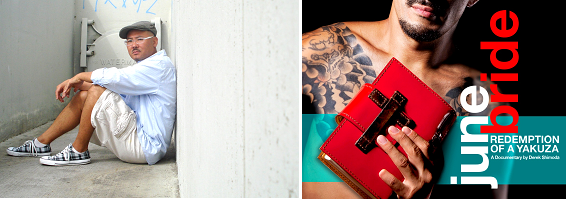
One of my favorite Asian American documentaries is The Killing of the Chinese Fortune Cookie, so when I heard the filmmaker, Derek Shimoda, was making another doc, I wanted to find out more. I had an opportunity to sit down with Derek and ask him 8Questions.
Derek Shimoda is a Los Angeles native. He produced the feature film In My Life as well as the acclaimed documentary Secret Asian Man, an official selection of the Sundance Film Festival. He wrote, produced, and directed the film Autonomous Soul, which won the Visionary Award at the Pan African Film Festival (PAFF). Over the past several years, Derek has worked on non-fiction series for several cable networks including The History Channel, The Travel Channel, and A&E. His debut feature-length documentary The Killing of a Chinese Cookie won Best Documentary at the 2008 Asian Film Festival of Dallas. He’s currently on the documentary June Bride: Redemption of a Yakuza.
Who are you and what do you do?
I’m a 2nd or 3rd, possibly 4th generation, Japanese American pseudo-filmmaker born and bred in Los Angeles. My father was born in Japan, and my mother and her mother, a kibei, were born in the U.S. So, what does that make me? If anyone can clarify this, school me at derek[a]fishgrenade[dot]com. Thanks in advance. You complete me.
Tell us about your newest film June Bride: Redemption of a Yakuza.
June Bride: Redemption of a Yakuza is a documentary that I’m currently shooting about Tatsuya Shindo, an ex-yakuza turned preacher and his rundown church, June Bride, where ex-convicts and outsiders congregate to start over. I initially wanted to do it on Shindo’s mentor, Hiroyuki Suzuki, also an ex-yakuza minister, but came across an article with Shindo’s contact info. I was excited and anxious to get the project moving after the minister warmly agreed to participate, so in late January of this year, I made the first trip to Japan to shoot preliminary interviews and b-roll. The goal is to make several more trips and have the film finished by Summer 2012.
Tatsuya Shindo seems like a very interesting person. What lessons have you personally learned from him?
I didn’t quite walk away with a life-altering lesson from Shindo but do admire him as someone who’s doing it. With two successful books published, You Can Always Start Over and The Mafia Minister’s Street Talk, Shindo’s life is nothing short of inspirational. His charismatic presence makes it difficult not to believe everything he says, a trait that comes in handy for a yakuza and preacher. One message he continually emphasizes is that people, at anytime, anywhere, can change and it’s evident by the people at June Bride who’ve done it. I’m not sure I subscribe to that belief completely but when Shindo was selling it I was buying.
What has been the biggest challenge of filming in Japan? On a similar note, have you found it difficult being Japanese American in Japan?
Living in Los Angeles makes it difficult to shoot at a moment’s notice in Japan and the time difference is challenging, so geography is the project’s biggest hurdle. It would be easier to shoot the documentary in one trip, from start to finish, but I don’t have the luxury of being gone for that long. Besides, I’d like to document a progression that takes place over more than just a month or two.
If keeping my mouth closed and blending in then no, it wasn’t difficult being Japanese American in Japan. If not being able to communicate in Japanese then yes, it was humbling. Instances like that prove how much smarter than my parents I was when I told them at age 16 that I wouldn’t be returning to Japanese Language School. Luckily, I enlisted the help of a friend, Rintaro Sawamoto, who fortunately overstayed his welcome in the U.S. and got deported back to Japan.
How has the earthquake affected your film?
I had just gotten back from Japan and was having dinner with a friend to discuss his participation as sound engineer on the doc. When I got home, breaking news of the earthquake in Japan began to broadcast. My immediate thoughts were about family and friends so I made sure they were okay. Then, I wanted Rintaro to record a phone conversation asking how Shindo was coping but Rintaro couldn’t muster the energy to devote to the documentary, which was more than understandable, and as a result, the project unfortunately lost momentum. Six months later, I’m determined to incorporate the tragedy as a way of highlighting Japan’s strength and spirit.
If you could have directed any film in history, what movie would it be?
I wish I could take credit for Women in the Dunes by Hiroshi Teshigahara. Teshigahara, Kobo Abe and Toru Takemitsu? Japanese New Wave’s Dream Team? Man, don’t tease me with that question, Koji.
Any advice to young Asian Pacific Islander American documentarians?
My advice? Only consider an interesting idea that speaks to you, a project that you eat, drink and sleep. No one should care more about your idea than you do. If they do, tuck and roll yourself out of that train wreck and think of something else.
How can people support your film?
People looking to earn their angel or chicken wings can support the film at Kickstarter.
If the campaign is successful, a portion of the funds raised will go to Red Cross for Japan and the film will get funded. Also, every generous donation appeases the film gods and a kitten’s life is spared. So, if not for a great cause then do it for the kittens – the silly, defenseless kittens!








